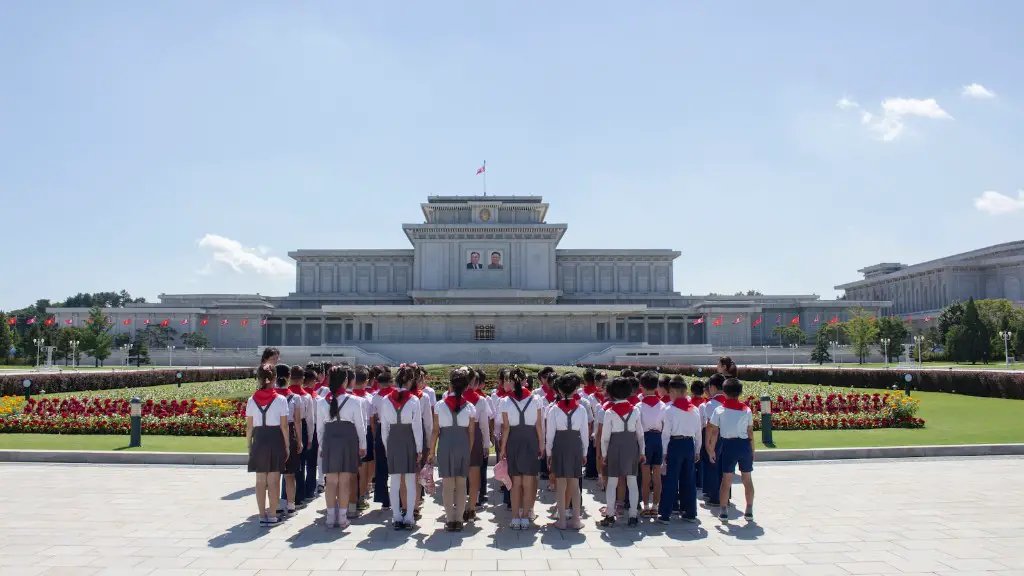Korean Conflict History
Korean War, sometimes referred to as the undeclared war, took place from 25 June 1950 to 27 July 1953. The war resulted in a shaky peace between North Korea, South Korea and China. The armistice agreement signed in 1953 established a demilitarized zone (DMZ) separating the two countries. The two Koreas, however, remain technically in a state of war, with a ceasefire enforced by the United Nations, but with no official end to the conflict. This has been a source of concern to international organizations and governments around the world.
The continued presence of US troops in South Korea as well as the North Korean military buildup has generated fear of renewed conflict on the Korean Peninsula. Additionally, North Korea’s refusal to abandon its nuclear weapons program has further caused an increase in tension. In recent years, North Korea has conducted a series of weapons tests, including the launching of a missile over Japan and testing of nuclear weapons. This has led to further United Nations sanctions against the regime and threats of potential US military action.
The Risk of War
Despite the long history of tension between North and South Korea, the chance of a war breaking out is slim. For one, the United States and China, two of the strongest regional powers, have an interest in avoiding war. Additionally, both Koreas are acutely aware of the catastrophic losses that could be incurred in a major conflict.
However, there are still major risks that could trigger a conflict. One of the greatest risks is a failure in communication between the two countries, leading to a blatant provocation by either side. Another risk is miscalculation due to poor intelligence gathering or an unexpected change in the internal politics of either side. Furthermore, the US is increasingly taking a hard line stance against North Korea, raising the risk of military conflict.
Impact Of War
The consequences of any armed conflict between the two Koreas would be devastating. An estimated 30,000 US troops are currently deployed in South Korea. The US troops are supported by troops from other nations, including South Korea, Japan, and various EU countries. This makes a confrontation between North and South Korea a potential international conflict.
Moreover, the economic toll of war could be immense. South Korea is a major US ally and trading partner, and both countries acknowledged their strong economic ties in 2017 when they signed a revised Free Trade Agreement. Furthermore, the North Korean regime could resort to using weapons of mass destruction, such as nuclear missiles, resulting in mass destruction even in neighboring countries.
Preventive Measures
In order to mitigate the risk of war, the US, South Korea and other regional powers have taken several preventive measures. The South Korean government has made it a priority to engage in diplomatic outreach to North Korea, and the two countries have engaged in regular diplomatic meetings since 2018. The US government has also made repeated attempts to diffuse tension, through diplomats and through economic sanctions.
Furthermore, the US and South Korea have committed to increasing their joint security measures. In 2019, the two countries increased the defense budget for the South Korean military, and are cooperating on the deployment of defense systems like the THAAD missile defense system.
International Pressure
The international community has also been increasingly pushing for a resolution to the Korean conflict. In 2017, China and Russia, the two countries with the closest ties to North Korea, have increased their pressure on the North Korean regime to abandon its nuclear program. Both countries have agreed to enforce stricter United Nations sanctions against North Korea, and have actively sought to negotiate with the regime. Additionally, the US government has also been pressing North Korea to comply, though with limited success.
Despite the pressure, North Korea has remained defiant, and there is no clear end to the conflict in sight. In order to deescalate the risk of war, both North and South Korea must work together to find a solution. Additionally, the international community must keep putting pressure on the North Korean regime to abide by the United Nations sanctions.
Shifting International Dynamics
In recent years, the international environment has undergone major changes, which could potentially influence the dynamics in the Korean Peninsula. In January 2021, the Biden Administration assumed control of the US government, a change which could potentially bring a new perspective on the conflict between the two Koreas. Additionally, in the past year, China has steadily been increasing its influence in the region, which could further influence the diplomatic dynamic.
These shifting dynamics offer a unique opportunity to bring the tensions between North and South Korea to an end. Diplomatic efforts between the US, China, and South Korea could prove successful in convincing North Korea to abandon its nuclear program and its aggressive posture. However, it remains to be seen if the new US Administration will bring the necessary pressure to bring the conflict to an end.
Public Opinion
While the risk of war remains low, the public perception of such a conflict is largely negative. In recent public opinion polls, a significant majority of South Koreans expressed opposition to potential military action against the North. On the other hand, the majority of North Koreans expressed support for their government and denounced the US for its hostile attitude.
Similarly, the general public around the world appears to be against the prospects of war. The majority of participants in international surveys in 2020 expressed that they believed that further sanctions, rather than military force, should be employed in order to resolve the conflict. Furthermore, the majority of survey participants stated that they would oppose any US-led military action against North Korea.
Economic Impact
An armed conflict between North and South Korea could have a profound economic impact, particularly in regards to trade and the stock market. South Korea is an export-reliant economy, and any conflict could have a negative effect on the South Korean currency and stock market. In addition, US trade with South Korea could suffer in the event of an armed conflict as US shipments would undoubtedly be impacted.
Moreover, an armed conflict could have a further economic impact beyond the region. Most notably, any disruption to the Middle Eastern oil production could greatly impact global markets with ripple effects that could be felt around the world. In this light, it is important to consider the economic impacts of a potential conflict when assessing the risk of war in the Korean Peninsula.
Regional & Global Security
The risk of war in the Korean Peninsula is not only a matter for the two countries involved, but also a concern for global security. Any conflict would have a direct impact on the United Nations Security Council, the US, and other powerful nations in the region. As such, these powers have shown a heightened sense of responsibility in de-escalating the risk of war.
Furthermore, a conflict in the region could further destabilize the wider East Asian region. This would further further be a threat to populations beyond Korea, and would negatively impact the geopolitical security of East Asia. For example, a conflict could disrupt key trade routes and affect the economies of neighboring countries.
Future Peace Negotiations
Despite the high level of tension, both North and South Korea have expressed their willingness to engage in peace negotiations. South Korea has repeatedly stressed the importance of multilateral negotiations, and has called for the establishment of a formal peace treaty between the two countries. Similarly, North Korea has expressed interest in discussing a peace treaty, though its stance on the matter remains unclear.
The US government has also expressed an interest in engaging in a peaceful resolution of the conflict. The United States has maintained a strong military presence in South Korea, and the US government has repeatedly made clear its disapproval of North Korean aggression.
It remains to be seen if North and South Korea will be able to reach an agreement, and if the international community will be able to mediate a peaceful resolution to the conflict. While the risk of war remains low, the threat of an armed conflict still hangs over the Korean Peninsula.





